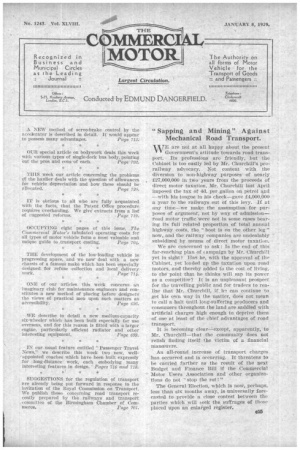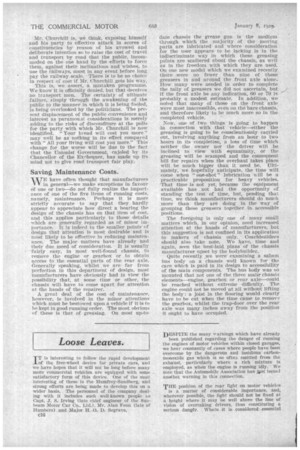"Sapping and Mining ". _Against Mechanical Road Transport.
Page 1

Page 2

If you've noticed an error in this article please click here to report it so we can fix it.
E are not at all happy about the present Government's attitude towards road transport. Its professions are friendly, but the Cabinet is too easily led by Mr. Churchill's pro' railway advocacy. Not content with the diversion to non-highway purposes of nearly £27,000,000 in to years from the proceeds of direct motor taxation, Mr. Churchill last April imposed the tax of 4d, per.gallon on petrOl and —with his tongue in his cheek—gave £4,000,000 a year to the railways, out of this levy. If at any time—we make the assmnption for purposes of argument, not by way of admission-road motor traffic were not in some cases bearing its full' related proportion of total annual highway costs, the " boot is on the other leg" now, and the railway companies are undeniably subsidized by means of direct motor taxation.
We are concerned to ask : Is the end of this far-reaching plan of campaign by Mr. Churchill yet in sight? Has he, with the approval of the Cabinet, yet loaded up the taxation upon road motors, and thereby added to the cost of to the point that he thinks will sap its power as a competitor? It is an unpleasant proSpect for the travelling public and for traders to rea lize that Mr. Churchill, can continue tO get. his own way in the matter, does not mean to call a halt until long-suffering producers and 'consumers throughout the land are saddled with artificialcharges high enough to, deprive them of one at least of the chief advantages of road transport.
It is becorning clear—except, apparently, to Mr. Churchill—that the community does not relish finding itself the victim of a financial manceuv re.
An all-round increase of transport charges has occurred and is occurring. It threatens to be carried farther as the result of the .next Budget and Finance Bill if the Commercial • Motor Users Association and other organizations do not stop the rot I" • The General Election, which is now, perhaps, less than six months away, is universally forecasted to provide a close contest between the parties which will seek the suffrages of those placed upon an enlarged register. • Mr. Churchill is, we think, exposing himself and his party to effective attack in scores of constituencies by reason of his avowed and deliberate intention so to raise the cost of travel and transport by road that the public, incommoded on the one hand by the efforts to force them, against their inclinations and wishes, to use the railways, must in any event before long pay the railway scale. There is to be no choice in respect of cost if Mr. Churchill gets his way. This is, we assert, a mistaken programme. We know it is officially denied, but that deceives no transport men. The certainty of ultimate failure, simply through the awakening of the public to the manner in which it is being fooled, is being overlooked by the politicians. The present displacement of the public convenience and interest as paramouat considerations is merely adding to the risks of discomfiture at the polls for the party with which Mr. Churchill is now identified. "Your bread will cost you more" may well be as nothing in its effect compared with "All your living will cost you more." This change for the worse will he due to the fact that the Unionist Government, cajoled by its Chancellor of the Exchequer, has made up its mind not to give road transport fair play.
Saving Maintenance Costs.
WE have often thought that manufacturers in general—we make exceptions in favour of one or two—do not fully realize the importance of one of the five items of running costs, namely, maintenance. Perhaps it is more strictly accurate to say that they hardly appear to appreciate how direct a bearing the design of the chassis has on that item of cost, and this applies particularly to those details which are generally regarded as of minor importance. It is indeed to the smaller points of design that attention is most desirable and is most likely to be effective. in .reducing maintenance.The major matters have already had their due meed of consideration. It is usually fairly easy, in most -well-found chassis, to remove the engine or gearbox or to obtain access to the essential parts of the rear axle. Generally speaking, whilst . we are far from perfeei:ion in this department of design, most 'Manufacturers have obviously had in view the possibility that, at some time or other, the chassis will have to come apart for attention at the hands of the repairer. A great deal of the cost of maintenance, however, is involved in the minor attentions which must be bestowed upon a vehicle if it is to be kept in good running order. The most obvious of these is that of greasing. On most up-to date chassis the grease gun is the medicam through which the majority of the moving parts are lubricated and where consideration for the user appears to be lacking is in the indiscriminate way in which these greasing points are scattered about, the chassis, as welt as in the freedom with which they are used. On one new model which we examined recently there were no fewer than nine of these greasers in and around the front axle alone. How many were needed in order to complete the tally of greasers we did not ascertain, but if the front axle be any indication, 60 or 70 is probably a modest estimate. In addition, we noted that many of those on the front axle were most inaccessible, even on the bare chassis, and therefore likely to be much more so in the completed vehicle. Now, one of two things is going to happen in connection with that vehicle—either the greasing is going to be conscientiously carried out, involving anything from an hour to two hours in its completion, a loss of time which neither the owner nor the driver will be Inclined to • view with equanimity, or the greasing will be scamped and the consequent bill for repairs when the overhaul takes place will be much bigger than it need be. Ultimately, we hopefully anticipate, the time will come when " one-shot " lubrication will be a practicable proposition for heavy vehicles. That time is not yet, because the equipment available has not had the opportunity of standing the test of time, but, pending that time, we think manufacturers should do much more than they are doing in the way of grouping these greasers together in accessible positions. The foregoing is only one of many snrall matters which, in our opinion, need increased attention at the hands of manufacturers, but this suggestion is not confined in its applicatioe to makers of chassis only. Coachbuilders should also take note. We have, time and again, seen the best-laid plans of the chassis manufacturer upset by the bodybuilder. Quite recently we were examining a saloon bus body on a chassis well known for the care which is paid in its design to accessibility of the Main components. The bus body was so mounted that not one of the three mainchassis elements—engine, gearbox or rear axle—could be reached without extreme difficulty. The engine could not be rnoved'at all without lifting the body : a joist in the flooring would clearly have to be cut When the time came to remove the gearbox, whilst the trap-door over the rear axle was many inches away from the position it ought to have occupied.




































